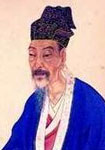《許給事見示哭工部劉尚書詩因命同作》 劉禹錫
唐代 劉禹錫 漢室賢王後,许给许给锡原析和孔門高第人。事见示哭书诗事见示哭书诗诗意濟時成國器,工部工部樂道任天真。刘尚刘尚刘禹
特達圭無玷,因命因命译赏堅貞竹有筠。同作同作
總戎寬得眾,文翻市義貴能貧。许给许给锡原析和
護塞無南牧,事见示哭书诗事见示哭书诗诗意馳心拱北辰。工部工部
乞身來闕下,刘尚刘尚刘禹賜告臥漳濱。因命因命译赏
榮耀初題劍,同作同作清羸已拖紳。文翻
宮星徒列位,许给许给锡原析和隙日不回輪。
自昔追飛侶,今為侍從臣。
素弦哀已絕,青簡歎猶新。
未遂揮金樂,空悲撤瑟晨。
淒涼竹林下,無複見清塵。
分類:
作者簡介(劉禹錫)

劉禹錫(772-842),字夢得,漢族,中國唐朝彭城(今徐州)人,祖籍洛陽,唐朝文學家,哲學家,自稱是漢中山靖王後裔,曾任監察禦史,是王叔文政治改革集團的一員。唐代中晚期著名詩人,有“詩豪”之稱。他的家庭是一個世代以儒學相傳的書香門第。政治上主張革新,是王叔文派政治革新活動的中心人物之一。後來永貞革新失敗被貶為朗州司馬(今湖南常德)。據湖南常德曆史學家、收藏家周新國先生考證劉禹錫被貶為朗州司馬其間寫了著名的“漢壽城春望”。
《許給事見示哭工部劉尚書詩因命同作》劉禹錫 翻譯、賞析和詩意
《許給事見示哭工部劉尚書詩因命同作》是唐代劉禹錫創作的一首詩詞。以下是它的中文譯文、詩意和賞析:
中文譯文:
漢室賢王後,孔門高第人。
濟時成國器,樂道任天真。
特達圭無玷,堅貞竹有筠。
總戎寬得眾,市義貴能貧。
護塞無南牧,馳心拱北辰。
乞身來闕下,賜告臥漳濱。
榮耀初題劍,清羸已拖紳。
宮星徒列位,隙日不回輪。
自昔追飛侶,今為侍從臣。
素弦哀已絕,青簡歎猶新。
未遂揮金樂,空悲撤瑟晨。
淒涼竹林下,無複見清塵。
詩意:
這首詩以哭悼工部尚書劉君的方式,表達了作者劉禹錫對於時代的變遷和個人命運的感慨。詩中描繪了漢室賢王後和孔門的高才子,他們在曆史的舞台上發揮了重要的作用。他們以清廉的品德和堅守正道的精神,成為了濟世奉公的楷模。詩人借用特達圭無玷和堅貞竹有筠的比喻,來形容這些偉大的人物。他們總結了戎事,使國家安定,尊重市井的道德準則,珍視貧窮但有能力的人。詩人抱怨說,現在沒有人保護邊塞,也沒有人追求北辰的道德標準。他請求能夠進入朝廷,向皇帝陳述自己的憂慮。他感歎自己曾經有過的榮耀,但如今已經衰頹。宮殿中的星星隻是虛位,太陽在天空中不再回轉。詩人自稱曾經追隨令人羨慕的飛侶,但現在隻是一個隨從臣子。他的琴弦不再奏響悲傷的音樂,他的官職已經荒廢。他感歎著在淒涼的竹林下,再也看不到清新的塵土。
賞析:
這首詩詞展示了劉禹錫對於時代變遷和個人命運的悲涼感受。他通過對賢王後和孔門高第人的讚美,表達了對過去時代高尚人物的向往與懷念。詩中對於道德準則的重視以及對於貧窮但有能力之人的尊重,展示了作者對於公正和正義的追求。然而,詩人也表達了對於現實社會的失望和不滿,認為當前的政治環境已經不能保護邊塞,也沒有人追求高尚的道德。他希望能夠進入朝廷,向皇帝陳述自己的憂慮,但他的願望未能實現。整首詩以淒涼的氛圍為主調,通過描繪竹林下的荒寂和清塵的消失,表達了詩人內心的孤寂和失落。
《許給事見示哭工部劉尚書詩因命同作》 is a poem written by Liu Yuxi during the Tang Dynasty. Here is the Chinese translation, poetic meaning, and analysis of the poem:
Chinese Translation:
漢室賢王後,孔門高第人。
濟時成國器,樂道任天真。
特達圭無玷,堅貞竹有筠。
總戎寬得眾,市義貴能貧。
護塞無南牧,馳心拱北辰。
乞身來闕下,賜告臥漳濱。
榮耀初題劍,清羸已拖紳。
宮星徒列位,隙日不回輪。
自昔追飛侶,今為侍從臣。
素弦哀已絕,青簡歎猶新。
未遂揮金樂,空悲撤瑟晨。
淒涼竹林下,無複見清塵。
Poetic Meaning:
This poem, "In Response to Seeing the Mourning of Minister Liu from the Ministry of Works, as Ordered to Write Together," expresses Liu Yuxi's feelings about the changes in the era and his personal fate. The poem portrays the virtuous princes of the Han dynasty and scholars from the Confucian school who played significant roles in history. They were paragons of integrity and dedicated themselves to the pursuit of truth. The poem uses the metaphors of flawless jade and steadfast bamboo to describe these great figures. They contributed to the stability of the nation and upheld the moral principles cherished by the common people, valuing the abilities of the poor. The poet laments that there are no longer protectors of the borders, and the pursuit of moral excellence symbolized by the Northern Star has been neglected. He pleads to be allowed into the court to express his concerns to the emperor. He sighs about the fading glory he once experienced, and the insignificance of the palace stars that do not revolve with the passing days. The poet used to chase after admirable companions, but now he is merely a subordinate. The strings of his musical instrument no longer produce mournful melodies, and his official position has become neglected. He laments the desolation beneath the bamboo grove and the absence of the once-clear dust.
Analysis:
This poem showcases Liu Yuxi's lamentations about the changes in the era and his personal fate. Through his praise of the virtuous princes and scholars of the Confucian school, he expresses his longing and nostalgia for the noble figures of the past. The poem emphasizes the importance of moral principles and the respect for capable individuals, particularly those who are poor. This reflects the poet's pursuit of justice and righteousness. However, the poet also expresses disappointment and dissatisfaction with the current social reality, where the political environment fails to protect the borders and uphold moral excellence. He desires to enter the court and share his concerns with the emperor, but his wishes remain unfulfilled. The poem exudes a sense of desolation throughout, depicting the emptiness beneath the bamboo grove and the disappearance of the once-clear dust, conveying the poet's solitude and sense of loss.
《許給事見示哭工部劉尚書詩因命同作》劉禹錫 拚音讀音參考
xǔ jǐ shì jiàn shì kū gōng bù liú shàng shū shī yīn mìng tóng zuò
許給事見示哭工部劉尚書詩因命同作
hàn shì xián wáng hòu, kǒng mén gāo dì rén.
漢室賢王後,孔門高第人。
jì shí chéng guó qì, lè dào rèn tiān zhēn.
濟時成國器,樂道任天真。
tè dá guī wú diàn, jiān zhēn zhú yǒu yún.
特達圭無玷,堅貞竹有筠。
zǒng róng kuān dé zhòng, shì yì guì néng pín.
總戎寬得眾,市義貴能貧。
hù sāi wú nán mù, chí xīn gǒng běi chén.
護塞無南牧,馳心拱北辰。
qǐ shēn lái què xià, cì gào wò zhāng bīn.
乞身來闕下,賜告臥漳濱。
róng yào chū tí jiàn, qīng léi yǐ tuō shēn.
榮耀初題劍,清羸已拖紳。
gōng xīng tú liè wèi, xì rì bù huí lún.
宮星徒列位,隙日不回輪。
zì xī zhuī fēi lǚ, jīn wèi shì cóng chén.
自昔追飛侶,今為侍從臣。
sù xián āi yǐ jué, qīng jiǎn tàn yóu xīn.
素弦哀已絕,青簡歎猶新。
wèi suì huī jīn lè, kōng bēi chè sè chén.
未遂揮金樂,空悲撤瑟晨。
qī liáng zhú lín xià, wú fù jiàn qīng chén.
淒涼竹林下,無複見清塵。
網友評論
* 《許給事見示哭工部劉尚書詩因命同作》許給事見示哭工部劉尚書詩因命同作劉禹錫原文、翻譯、賞析和詩意专题为您介绍:《許給事見示哭工部劉尚書詩因命同作》 劉禹錫唐代劉禹錫漢室賢王後,孔門高第人。濟時成國器,樂道任天真。特達圭無玷,堅貞竹有筠。總戎寬得眾,市義貴能貧。護塞無南牧,馳心拱北辰。乞身來闕下,賜告臥漳濱。榮 的古诗全文、翻译备注、注释释文、拼音读音、品鉴赏析、古诗诗意以及网友评论信息。
《許給事見示哭工部劉尚書詩因命同作》許給事見示哭工部劉尚書詩因命同作劉禹錫原文、翻譯、賞析和詩意原文,《許給事見示哭工部劉尚書詩因命同作》許給事見示哭工部劉尚書詩因命同作劉禹錫原文、翻譯、賞析和詩意翻译,《許給事見示哭工部劉尚書詩因命同作》許給事見示哭工部劉尚書詩因命同作劉禹錫原文、翻譯、賞析和詩意赏析,《許給事見示哭工部劉尚書詩因命同作》許給事見示哭工部劉尚書詩因命同作劉禹錫原文、翻譯、賞析和詩意阅读答案,出自《許給事見示哭工部劉尚書詩因命同作》許給事見示哭工部劉尚書詩因命同作劉禹錫原文、翻譯、賞析和詩意的作品
版权声明:本文内容由网友上传(或整理自网络),原作者已无法考证,版权归原作者所有。就爱诗词网网免费发布仅供学习参考,其观点不代表本站立场。
转载请注明:原文链接 | https://dd110.com/chengyu/374f39931793782.html
诗词类别
《許給事見示哭工部劉尚書詩因命同的诗词
- 《代書呈張功父》代書呈張功父楊萬裏原文、
- 《上洛橋》上洛橋李益原文、翻譯、賞析和詩
- 《蝶戀花》王詵原文、翻譯、賞析和詩意(蝶
- 《踏莎行》歐陽修原文、翻譯、賞析和詩意(
- 《除夜大雪留濰州元日早晴遂行中途雪複作》
- 《寇準讀書》寇準讀書佚名原文、翻譯、賞析
- 《白石灘》白石灘王維原文、翻譯、賞析和詩
- 《詠梅九首》詠梅九首高啟原文、翻譯、賞析
- 《題古磵》題古磵文天祥原文、翻譯、賞析和
- 《清平樂》納蘭性德原文、翻譯、賞析和詩意
热门名句
- 《處士妻十首》處士妻十首劉克莊原文、翻譯
- 《詠懷八十二首·其七十九》詠懷八十二首·
- 《蘇秀道中》蘇秀道中曾幾原文、翻譯、賞析
- 《采蓮曲》采蓮曲劉方平原文、翻譯、賞析和
- 《寄沂州王學士》寄沂州王學士宋祁原文、翻